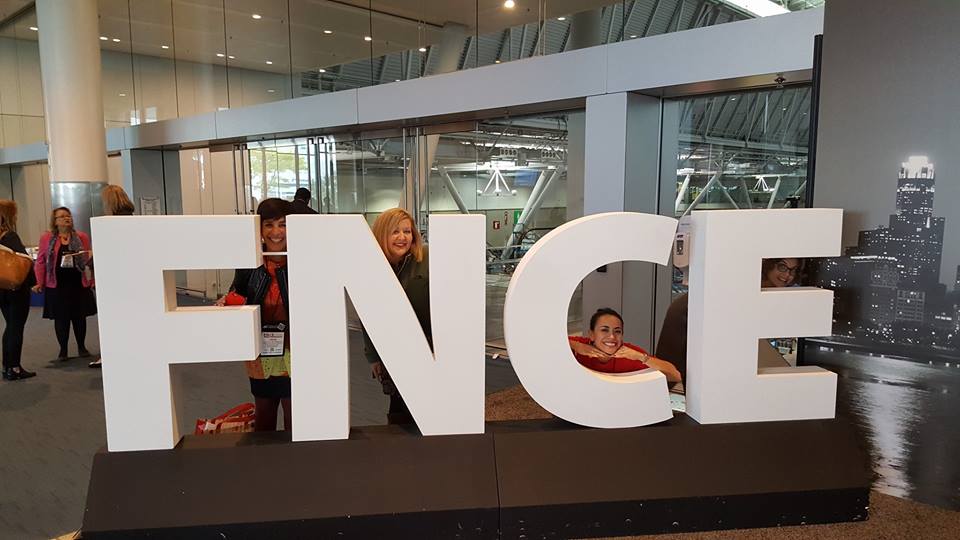
This year, 10,400 registered dietitians, registered diet technicians and students (along with certified personal trainers, food scientists, and others), went to Boston to participate in the annual conference called FNCE® (food, nutrition conference and expo). I didn’t get much sleep there, but had a blast. Opening session was delivered by the current president, Lucille Beseler (aka the self-proclaimed “Prez Lucille”). Following her was entrepreneur Barbara Corcoran, from the popular TV show Shark Tank, who brought laughs and told us her rags to riches story, including moments that led to her success. Attending this opening afternoon session is always an inspirational way to get ready to begin learning the next day.
As I mentioned in my last post, I’m sharing some highlights and food trends. What always fascinates me is how food culture affects the food market. Many new products are targeting Millennials, and older brands maintain the Gen X or Baby Boomer generations. One market or brand is not better than the other, but instead may serve different purposes.
- GUT HEALTH. This convo was everywhere, from educational sessions to products on the expo floor. All sorts of products filled the floor – probiotic supplements, food with added probiotics, fermented foods, or “gut shots” (fermented foods in a drinkable liquid). While we really don’t have all of the science about how the gut microbiome impacts our health and body systems, this discussion will continue for sure.
- PROTEIN. Everyone is looking for new ways to add protein to each meal, as research continues regarding the ideal amount and timing of protein in your diet. Products range from high protein snacks (chips, bars), to naturally occurring protein (nuts, fish, meats), to ultra filtered milk with higher protein content (Fairlife® is a product that I personally really enjoy – great flavor, and 13 grams of protein per 8-ounces compared to 8 in traditionally processed cow’s milk)
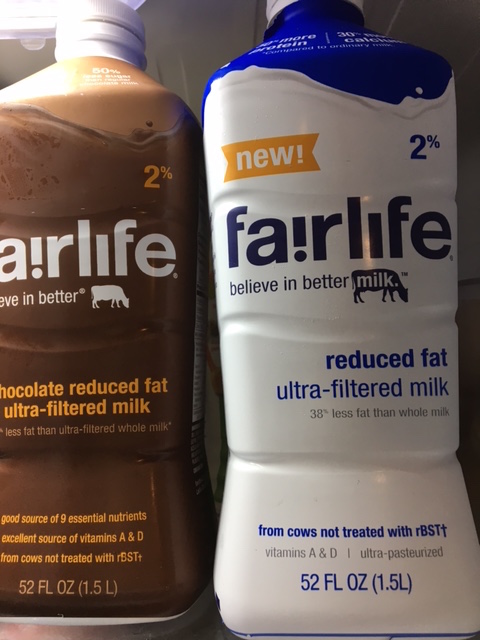
- ORGANIC. The “natural and organic” area of the Expo was mobbed, and there were many products featured. I stand by the idea that “Organic” in itself does not mean better nutrition. What I want consumers to understand is that an Organic snack food is still a snack food. For instance, an “organic, non-GMO, gluten free chip” is still a chip, still about 140 calories per ounce, and should not displace eating whole foods and cooking meals with real food. And I have a pet peeve about labeling foods “non GMO” when they never had any GMO ingredients in them in the first place, but marketing generally overrides clear facts, and there’s a market segment for it.
Organic brands got plenty of space and attention.
- BEVERAGES. Since soda is the bad guy, we saw less soda and more sparkling waters, protein water, smoothies, dairy supplements, nondairy beverages, or other beverages in new flavors and innovative packaging. Shasta has created new sparkling water flavors for both the food service industry and grocers (to be on shelves soon).
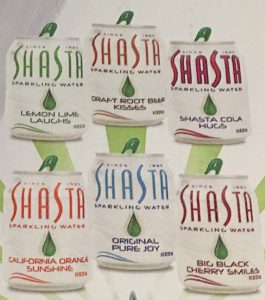
- GRAINS, BEANS, AND PASTA. Grains are a healthy part of the DASH Diet, and pasta is also a quick and delicious way to get dinner on the table. Whole grains are important to incorporate, but other refined grains are okay too. I love that companies are creating whole grain products that make it quick and easy to get them on the dinner table on busy days. Minute Rice® offers a multi-grain medley product that can come in handy on a busy weeknight. The Barley Council of Canada offered great recipes (and people need recipes!). Sorghum products were also highlighted as a versatile US crop. Perhaps this grain is the “next Quinoa”.
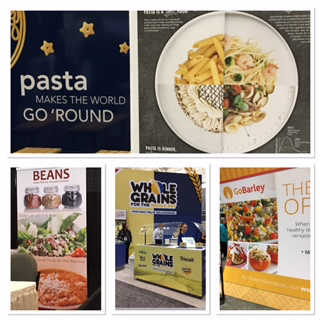
- YOGURT. Okay, I admit it – by day two of the conference I was sick of yogurt. It was everywhere. And I love yogurt. Joking aside, what consumers are looking for in a good yogurt is unique flavors, high protein content, and less sugar. More companies are adding less sugar to their yogurt, and this will likely be encouraged with the new “added sugars” line to the upcoming Nutrition Facts Label. Some purveyors also shared creative ways to add additional nutrition to yogurt via parfaits (toasted coconut, chopped nuts, berries) or smoothies. Dietitians love yogurt as evidenced by the line at every brand’s booth.
- SUSTAINABLE SEAFOOD. The DASH and Mediterranean diets recommend including fish or seafood weekly. As the demand for fish increases, U.S. and international fisheries are looking for sustainable ways to maintain supply. There were several educational sessions on this topic, as well as representatives of the industry on the Expo floor.
Personal VS Practical
When I sample new foods at the product expo at FNCE® I do so with a curious mind and my own tastebuds. I like learning about what is on the market so I can be in-the-know when consumers talk about these new foods. But just because I taste it or see it, does not mean I recommend it. Nor does it mean I tell people to avoid it. For instance, there were lots of Organic Non GMO snack foods at the Expo, since this is a current trend on the market. One of the chips, Protes, boasted a “low calorie, high protein chip”. I joked with the vender rep and told him I’d rather just eat potato chips, and get my protein from a glass of milk, an egg, or eat an extra ounce of fish or a handful of nuts. On the other hand, replacing a one-ounce bag of potato chips with these chips would supplement the total protein of your lunch meal. In any case, I am not going to insist that anyone buys these or eat them daily, but if a patient asked about them, I could give him the pros and cons, and explain that fruits and vegetables are still an important way to get fiber and antioxidants; and there are better ways to add protein into your diet. Don’t let any sort of snack chip displace those foods.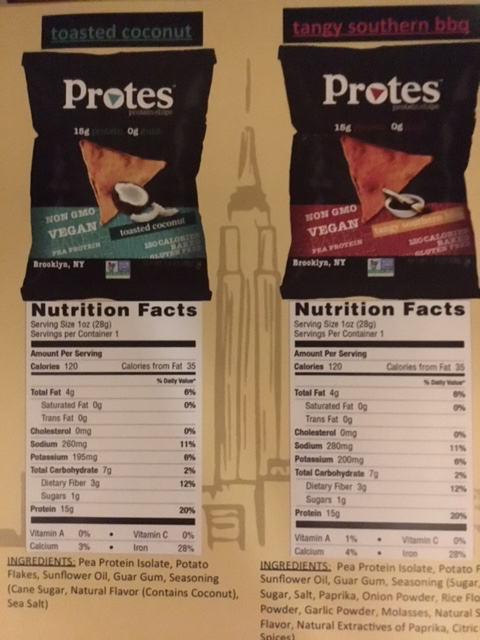
The Takeaway
When it comes to what foods to eat, or what diet to follow, I have these words:
“It depends”
Each one of us is different, and a dietitian’s goal is to help you eat as well as possible. As Dr. David Katz said during a session, it’s our common ground that can support healthy eating habits across the country. Not whether or not you like this yogurt, and I like that one.
As a dietitian, I have no interest in crusading to stop the food industry from coming up with new products (although I would like to see less front of package labeling claims) and I also do not feel it’s my role to tell people exactly which foods or brands to eat, or to “eat what I eat”. There are many paths to a healthy diet, and my goal is to allow you to think for yourself, and find creative ways to add more fruits and vegetables and other healthy foods to your diet (that you tolerate and enjoy eating). The goal is to stay as healthy as you can be. I know you can do it.
Other Dietitian Takeaways about New Products and Trends spotted this year:
Why I’m okay with Soda Companies Sponsoring a Nutrition Conference – Lauren Harris-Pincus
No, It Wasn’t Raining Candy – Milton Stokes
Trendspotting at FNCE – Janet Helm at Nutrition Unplugged
My Top FNCE Take-Aways: Where Nutrition Science Meets Food Trends – Rebecca Scritchfield
Food Favorites at FNCE – Katie Morford at Mom’s Kitchen Handbook
Top 5 Nutrition Trends You Can Use Spotted at the Food and Nutrition Conference and Expo – Elena Paravantes Hargitt
Nutritious Meets Delicious – Carolyn O’Neil


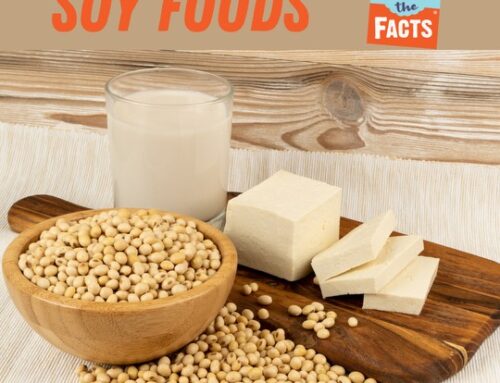


Thanks for a great summary. I appreciate your commonsense approach.
Did you know that gut health benefits are going far beyond the gut? Resistant starch, a fermentable fiber, improves insulin sensitivity and helps to reverse prediabetes? The FDA is evaluating a health claim petition that features 8 clinical studies showing 30-70% improved insulin sensitivity. They have delayed issuing their ruling three times already. Please join me in asking the FDA to rule on this important topic, which I am sure will be featured in the near future at FNCE!
https://www.change.org/p/u-s-fda-rule-on-the-petition-that-resistant-starch-reduces-the-risk-of-type-2-diabetes
Thanks.
Great summary…exciting products coming to store shelves!